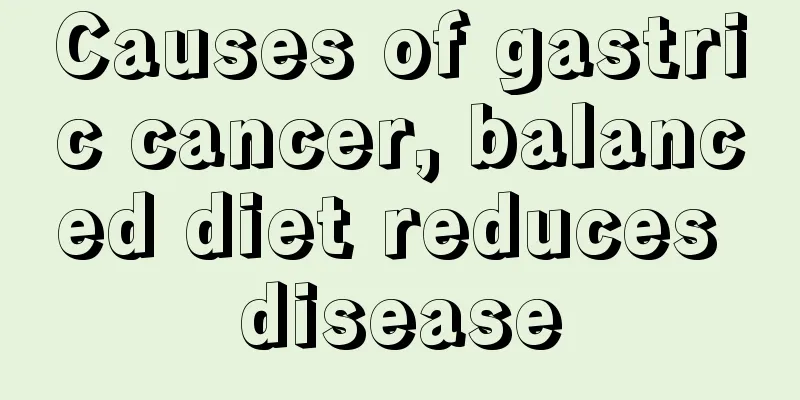Causes of gastric cancer, balanced diet reduces disease

|
There are many causes of gastric cancer. People nowadays have irregular lifestyles and sometimes skip meals. The stomach is damaged, and the initial minor stomach disease develops into gastric ulcer. If the gastric ulcer is not properly treated, there is a great possibility that it will cause gastric cancer. So if you want to have a good body, start with your stomach! 1. How does gastric cancer come about? Improper diet and lack of exercise It is a malignant disease caused by internal deficiency of vital energy, improper diet, emotional imbalance, etc., with qi stagnation, phlegm-dampness, and blood stasis in the stomach as the basic pathogenesis, and stomach disharmony as the main clinical manifestations. It is characterized by fullness or pain in the epigastric area, poor appetite, weight loss, melena, and epigastric lumps. The incidence of gastric cancer is about 40%-50% of the entire digestive tract cancer, ranking first among digestive tract cancers. For male patients, gastric cancer also ranks first among malignant tumors of various organs. Gastric cancer caused by environmental factors Industrial waste gas, fertilizers, pesticides, certain food additives, and moldy, fried, salted, smoked foods all contain carcinogens. It can promote the occurrence of gastric cancer, especially bad eating habits, often not eating on time, eating irritating food, etc., which can cause chronic irritation of the gastric mucosa, causing dysfunction, congestion, edema, erosion, and increase the chance of gastric mucosal cancer. When you are upset and in a bad mood, cancer will come to you The incidence of gastric cancer is relatively high in people who have suffered major trauma and those who are sulking. Those who are slow, dull, indifferent or irritable are at relatively lower risk, while those who are cheerful, optimistic and lively are at the lowest risk. A bad mood can also affect a person's appetite. It is best to go to bed early and get up early, and eat until you are 70% full. Eat less pickled foods In fact, pickled foods contain carcinogens. Although they go well with rice, eating them for a long time can cause cancer. Therefore, we should maintain good eating habits, eat more light food, and people with poor stomach should take good care of their stomach, eat less irritating food, and maintain three meals a day. 2. Early symptoms of gastric cancer Beware of stomachache Most gastric cancer patients experience stomach pain in the early stages of the disease. At first, patients only feel upper abdominal discomfort, bloating, heaviness, and sometimes dull pain in the pit of the stomach. Therefore, patients often mistake it for gastritis or ulcer disease. The symptoms can be temporarily relieved after treatment. If the lesion occurs in the patient's gastric antrum, it can induce functional changes in the duodenum and cause rhythmic pain similar to ulcer disease, which is often ignored by patients until persistent pain or even symptoms such as black stools or vomiting blood occur. By then, the patient's condition has often developed to the late stage of gastric cancer, and the best time for treatment has been lost. Loss of appetite and weight loss Patients may experience loss of appetite, weight loss, and fatigue, which are also a common but non-specific early signs of gastric cancer. Loss of appetite without stomach pain may be an early sign of gastric cancer. If it occurs simultaneously with stomach pain and hepatitis is ruled out, it should be taken seriously. Some patients automatically restrict their daily diet after experiencing symptoms such as abdominal distension and belching after eating, which causes weight loss, emaciation and fatigue. Since the patient's abdominal distension is mostly located below the xiphoid process or to the right, it is easily misdiagnosed as gallbladder disease. Nausea, vomiting and blood in the stool are signs of early gastric cancer Patients with early-stage gastric cancer may also experience a feeling of fullness after eating accompanied by mild nausea. Tumors in the cardia may initially cause eating difficulties, followed by symptoms such as difficulty swallowing and food regurgitation. Patients with early-stage gastric cancer often experience bloody stools, which is caused by the lesions destroying the small blood vessels in the stomach. Patients with a small amount of gastric bleeding may show positive occult blood in the stool, and patients with a large amount of bleeding may show vomiting blood and black stools. Elderly people who usually do not have stomach problems should be especially alert to the occurrence of stomach cancer if they have black stools. |
<<: Bile reflux gastritis, be alert to these symptoms!
>>: How to treat retinal edema? Four ways to eliminate edema
Recommend
Is Western medicine or traditional Chinese medicine better for treating insomnia
Both traditional Chinese medicine and Western med...
Can berberine lower blood sugar?
The most common use of berberine is in the treatm...
What are the dietary treatments for nasopharyngeal cancer? How much does it cost to treat nasopharyngeal cancer?
Nasopharyngeal cancer brings inconvenience to man...
What are the diagnostic criteria for primary liver cancer? Pay attention to these symptoms of primary liver cancer
Liver cancer is one of the most frightening and d...
What are the common symptoms of early lung cancer? 6 clinical manifestations of early lung cancer
In the early stages of lung cancer, lung cancer p...
What are the dietary care after rectal cancer surgery
What is the dietary care after rectal cancer surg...
Chest tightness during nap
If you feel chest tightness during a nap, you sho...
What does it mean to have a short tongue
There are differences between people. Not only ar...
What eye drops should I use for glaucoma
We always hear about glaucoma and cataracts. Glau...
What are the effects of Xiaodaohong
Ophiopogon japonicus is a plant, but it is now of...
Will a mud bath be useful?
I believe that many friends who have traveled abr...
Ovarian tumors and ovarian cysts
Ovarian tumors and ovarian cysts Most ovarian cys...
What are antibodies? The role of antibodies
Antibodies play a vital role in the human body, a...
What are the nursing methods for bladder cancer patients?
Bladder cancer refers to a variety of malignant t...
Can fractured bones and dislocations be repaired by themselves?
Fracture dislocation seems to be serious, and cor...









